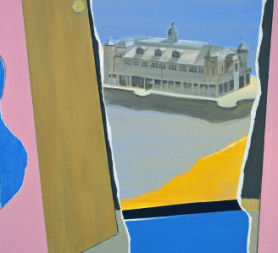Turner prize nominees: how do you sell it?
Stephanie West views the work nominated for Britain’s biggest art prize and asks whether age and anxiety are at the heart of the 2010 Turner Prize.

Once they’ve got over the thrill of the nomination, artists shortlisted for the annual Turner Prize have in the past, pondered how their work will be “explained” by journalists covering the story.
One of those in the running last year, Lucy Skaer, concluded maybe the media wasn’t a great place to talk about things that don’t have a clear story in them – i.e. her art. “When people interview me,” she explained, “they want to know how long it takes to make the work, but that doesn’t reveal anything.”
But each year demands its own theme, and so it was this morning at 9.30am, that when the shortlist for the 2010 Turner Prize was announced, journalists set to work, asking questions to establish an all-embracing peg for this year’s selection.
As you have to be under 50 to qualify for this award, the fact most of the contenders are mid-40s and one will see in a half a century by the end of the year (49-year-old Dexter Dalwood) age appeared to be a contender for best angle.
Was this a deliberate move to counter youth-obsession? No, said the new director of Tate Britain, that wasn’t intentional. As a 44-year-old myself, and one who wonders why surveys and society must always group us into age brackets, I was delighted when the age-grouping here was incidental.
The fact that the words “melancholy” and “seminal political events” and “humans in outer space contemplating the past” were used to explain the themes in the shortlisted works, led some to wonder if this collection of work represented an age of anxiety.
No, not according to the judges, who said it was for visitors to make the connection if they so wished, but the panel hadn’t gone looking for a theme.
The fact this year’s list is an eclectic one, was raised as a possible theme. Did the judges mean to go for this spread?
There’s the painter Dexter Dalwood from Bristol, who deals in paintings evoking past history, with increasingly political themes, including one entitled The Death of David Kelly.
There’s the site-specific sound installation artist Susan Philipsz from Glasgow, who sings and records melancholic laments that are then played over speakers in neglected environments.
There’s a pair of artists who work under the name of the The Otilith Group who deal in overlooked histories with film and photography, to deliberately “rework the borders of documentary and fiction.”
And finally, completing the shortlist of four, Angela de la Cruz who uses materials and paints on canvas, rich and complicated, a sheer pleasure to look at. Her work Stuck looks like the creamy skin of clotted cream being scraped off a picture frame.
No, we didn’t intentionally aim for this range, nothing as calculated as that, said the judges.
“Did someone turn down a nomination this year?” asked one journalist, addressing the rumour that Banksy had been thought of but had declined to be considered. “No”, said the chair.
Sigh. But look.
If past figures are repeated, for roughly three months, just short of a thousand people a day will troop up the beautiful white steps of Tate Britain, on the north banks of the Thames, where the river is high, specifically to see new work of the four modern artists who were shortlisted. The four contenders create new exhibitions that will go on display for a couple of months, from the beginning of October.
The 80,000 people will come even if no theme was established. They want to see the contenders, will post their views and comments if they feel so inclined, and while the judges may well read them, they’re not compelled to let public reaction influence their final decision.
And then in December the Turner Prize winner will be chosen. They’ll win £25,000 and the prize-giving will be carried live on Channel 4 News.
And the person we have to thank, ultimately for this prize?
You could argue it was that most favourite of British artists, JMW Turner, whose glorious water-colours and landscape paintings are housed in their own wing at Tate Britain, and who on his death in 1851, had left money to be used for “decayed artists.” In 1984 the Turner Prize was established in his honour.
The members of the Turner Prize 2010 Jury are –
Isabel Carlos: director, Centro de Arte Moderna
Andrew Nairne: executive director, arts strategy, Arts Council England
Polly Staple: director, Chisenhale gallery
Philip Hensher: novelist and art critic